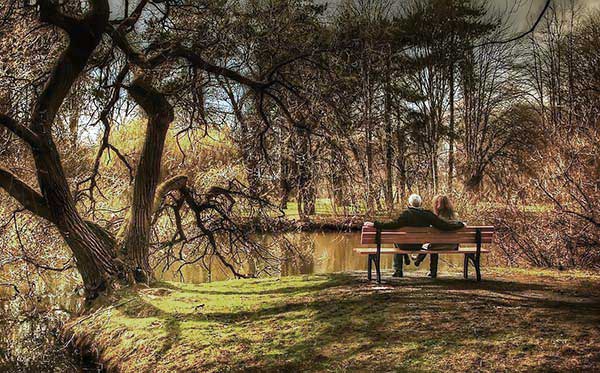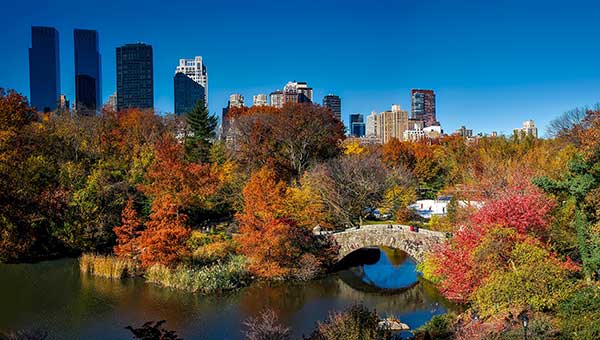 Two people relax on a park bench. Research shows that the average American visits a park 29 times a year
Two people relax on a park bench. Research shows that the average American visits a park 29 times a year
If the Trust for Public Land checked out parks in your town, would they reward the city with a bunch of park bench accolades for providing open spaces for local citizens?
Minneapolis certainly earned recognition. In fact, that city was given the highest ranking and a "Five Park Bench," award as the best park system in the US, according to a study conducted by the Trust for Public Land.
The Sixth Annual ParkScore survey was created by the trust to provide a benchmark for how cities rank for their parks compared to other municipalities. The research also provides guidance for city planners to use when considering the number of open spaces and amenities they should be providing for public use. (See list of Top 30 cities below).
Park bench ratings issued for cities with best park systems
According to the trust, they determined their rankings based on three factors:
- Access: how long does it take for a local resident to reach a park? They use a 10-minute walk as a guide. A huge park such as Central Park is great, but not everyone in New York lives within a short hike to get there. The trust looks for places that provide even a small patch of green grass with some comfortable park benches and shady trees that people nearby can escape to.
- Park size: the trust does take into account park size, looking for a median calculated from all the parks combined. Also, another big factor is the overall percentage of urban area that is set aside for parks. Obviously, the more parkland available, the more park bench awards the city will receive. The trust used their own high-tech GIS (geographic information system) technology to map the size of the various parks and measure accessibility such as the number of park entrances.
- Facilities and Investment: - the third factor used basically involves what can people do when they visit those parks. They look at the amount invested in park amenities and equipment per city resident.
As part of facilities, researchers also looked at the availability of four widely-used amenities you typically see at parks. They were recreation centers (including senior centers). Then playgrounds. Next would be the availability of basketball hoops.
Finally, the last amenity is the number of off-leash dog parks. Judging park quality by that criteria might seem surprising. But when you consider that today, nearly 45% of households in America own a dog, you can see how this amenity would be in big demand. (In fact, more and more parks are now adding dog playground equipment, so the dogs have something to play on, just like kids). Boise, ID, ranked at the top of canine-friendly cities with 7.2 dog parks per 100,000 residents.
"Everyone in America deserves to live within a 10-minute walk of a park," said Charlie McCabe, director of The Trust for Public Land's Center for City Parks Excellence in a press release. "Parks are proven to improve physical and mental health, increase property values, and bring neighbors together to nurture the personal bonds that make our communities special."
Parks are extremely popular with local residents. According to a survey conducted by the National Recreation and Parks Association, people in America report they go to their local park nearly 29 times a year. About 96% of Americans said someone in their house visited a local park in the last 12 months.
Conversely, there are two reasons why people don't visit parks. They either don't have the time…or their local parks don't have adequate facilities. That could mean fixing up those broken basketball hoops, adding another park bench or picnic table and perhaps specifying a clean place where Fido and Fifi can play.
As you can see from the NRPA survey, people love parks. Park managers are happy to know that nine out of 10 Americans believe parks are an important service provided by their local town officials. Seven in 10 said they are more likely to vote for a candidate who makes it known that parks are an important part of their platform.
That's why it should be a high priority for cities to earn those coveted park bench awards. Those awards were issued in addition to the rankings, so the efforts of each city could be evaluated and recognized. Cities receiving the highest "Five Park Bench" rating were Minneapolis, Saint Paul, and San Francisco.
Even if a city is not in the top ten, they certainly can strive to meet the criteria established by the trust regarding the number of parks, percentage of public land and adequate amenities.
 Fall in Central Park, NYC. Seven in 10 Americans say they are more likely to vote for a candidate who makes parks a top priority on their platform
Fall in Central Park, NYC. Seven in 10 Americans say they are more likely to vote for a candidate who makes parks a top priority on their platform
Top 30 cities for parks
Here are the top 30 rankings of 100 cities included in the study:
- Minneapolis
- Saint Paul
- San Francisco
- Washington, DC
- Portland
- Arlington, VA
- Irvine, CA (tied)
- New York City (tied)
- Madison, WI
- Cincinnati, OH
- Chicago
- Seattle
- Boston
- San Diego
- Aurora, IL
- St. Petersburg, FL
- Albuquerque (tied)
- Plano, TX (tied)
- St. Louis (tied)
- Denver
- Milwaukee (tied)
- Omaha (tied)
- Sacramento (tied)
- Fremont (all of the following cities tied)
- Las Vegas
- Lincoln, NE
- Long Beach
- Oakland
- San Jose
- Virginia Beach
This is the list of 10 cities with the lowest scores and a smaller number of "park bench" awards:
- Fresno, CA
- Hialeah, FL (tied)
- Jacksonville, FL (tied)
- Laredo, TX
- Winston-Salem, NC
- Mesa, AZ
- Louisville, KY
- Charlotte, NC
- Fort Wayne, IN (tie)
- Indianapolis (tie)
For people who are interested, the ParkScore report is free and available to the public. It can be used by park managers to see how they rank and how they can make improvements. It also gives them a tool to approach city officials for more funding.
"You can't have a great city without a great park system," said Adrian Benepe, Senior Vice President and Director of City Park Development for the trust. "ParkScore is a tool that city leaders can use to guide park improvement, helping planners identify where they should focus their efforts, so more residents can live within a 10-minute walk of a well-planned and well-maintained park."


